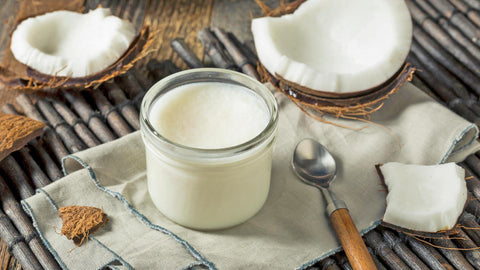
Coconut oil is now used far and wide in skincare and green beauty, but we tend to stay away from using it in our products.
Here's why. Coconut oil actually comes from the meat of a coconut and is composed of many fatty acids. These acids range from lauric acid, to myristic acid, palmitic acid, caprylic acid, capric acid, oleic acid, linoleic acid, and stearic acid.
Many beauty brands will use coconut oil for its secret sauce component, lauric acid. Lauric acid has many antibacterial properties and is a humectant and emollient properties. It makes up over 50% of the fatty acid in coconut oil and due to its high concentration of saturated fats, it has a longer shelf life and will not go rancid for a while. It's antimicrobial and pretty moisturizing. What people do not realize is that due to coconut oil's high concentration of fatty acids, it's actually quiiiiite comedogenic. This causes most people to break out from using it topically because the fatty acid composition clogs acne prone skin. What's worse is that it isn't a great skin moisturizer. Due to its chemical composition, coconut oil does not get absorbed into the skin super quickly. This is why you'll often have oily skin or hair after applying coconut oil on yourself, which can result in sebum getting thicker and thus clogging your pores.
The bottom line: Just because it is found in nature or is organic doesn't mean it's safe or effective for your skin! Check out our products here.
Sources
Lin, T. K., Zhong, L., & Santiago, J. L. (2017, December 27). Anti-Inflammatory and Skin Barrier Repair Effects of Topical Application of Some Plant Oils. Retrieved May 01, 2018, from https://www.ncbi.nlm.nih.gov/pubmed/29280987
Agero, A. L., & Verallo-Rowell, V. M. (2004, September). A randomized double-blind controlled trial comparing extra virgin coconut oil with mineral oil as a moisturizer for mild to moderate xerosis. Retrieved May, 2018, from https://www.ncbi.nlm.nih.gov/pubmed/15724344
Rele, A. S., & Mohile, R. B. (n.d.). Effect of mineral oil, sunflower oil, and coconut oil on prevention of hair damage. Retrieved May 2018, from https://www.ncbi.nlm.nih.gov/pubmed/12715094

Leave a comment